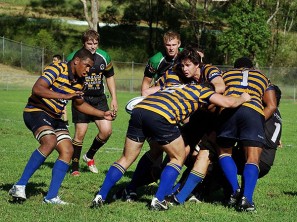plxmn
new author
Roar Rookie

The National Rugby Championships (NRC) almost here. The structure has been decided, the teams announced, the rosters named, the draw finalised. Will it work?
Time will tell, although I suspect that the initial season, at least, will be dogged by the lack of tribalism that comes with long-term support, and a lack of exposure that comes with a single broadcast game on pay television.
Will sponsors get and stay on board? Will the crowds turn out to the game? That will be the real indicator of success.
A third tier competition in whatever form it takes is a necessity for the game in Australia. But is the NRC the right format? I am not so sure.
Based on the bastard children of established but financially insecure semi-amateur clubs, the ARU has created a competition that will struggle to gain the excitement of the masses. In Sydney, and to a lesser extent Brisbane, the NRC has the capacity to diminish the traditional club competitions.
The NSW and Queensland teams, by and large, are born of odd mergers of traditional rivals leaving supporters with an odd conundrum: if my friend is to support a team that incorporates Warringah, is he therefore supporting those dastardly folks from Manly? Perhaps he should conclude that this team really does not represent him, and does nothing for his club.
Apathy is a killer for a commercial sporting competition. The rugby will be of a decent quality, for sure, but if I want to catch up on a good game over the weekend involving teams that mean nothing to me, the European competitions are only a few weeks away.
The ARU did not need to take on the traditional competitions, leaving uncertain fan-bases and the undoubted future internal bickering and power struggles that come with mergers. There is an alternative.
Universities are the largely untapped resource purpose built for rugby union in Australia.
Basing the teams around universities has massive upsides for Australian rugby, and the Abbott Government’s proposed changes to the university sector, like them or not, has opened a huge door that rugby union can leverage.
The Government’s changes have created a sense of competition in the higher education sector, meaning promotion of universities will be fundamental. This is the reason for the success of college sport in America: the colleges want to be involved because they need their school’s name to be known, and people passionate about the school.
The Government’s changes inherently move higher education in Australia towards the American system, and the Americans have made an art out of exploiting that system. We can learn from their approach.
To be clear, I make no judgement on the Government’s changes. But it is what it is.
Even without the changes to higher education, university involvement in rugby makes sense. Rugby may wish to broaden its appeal to the masses, but rather than try to throw away the private school label, maybe its time to embrace it and extend it to universities.
The reality is that most rugby union watchers in Australia remain to be university educated. Rugby is not going to win the war of the west, at least not yet. Rugby needs to shoot for the money.
Universities come with a ready made fan-base of present and former students, many of whom may have some spare cash around to throw towards sponsorship, established sporting facilities, a desire to promote, and importantly, a distinguishing feature from the traditional club competitions such to allow those competitions to retain pride in their place.
My Warringah friend could easily follow both his beloved Rats and his alma mater, Macquarie Uni.
The American system, of course, will not be a perfect fit for Australia. Not all players could be students. An under-23 competition would be enjoyable, but hardly third tier, and unlikely to gain the necessary popularity.
A quota system of present students would make more sense, mixing young and up-and-coming stars with the stalwarts of the club rugby game, along with a smattering of professionals not involved in the national team – in this regard, not unlike the NRC.
A requirement linking the under-23 players to the university would also make sense – scholarships would ensure not only the link to the university, but also mean that rugby is populated by persons with ready-made careers when their playing careers end.
It would also lessen the need for large player payments, with the other incentives at the school’s disposal. Sponsorship would also be a necessity, which does not exist in quite the same way in the American system.
Some universities in Australia already have a strong link to the game: Sydney University, University of Queensland and the home of the Brumbies, University of Canberra, come to mind. UC in particular, with no great history in rugby (UC does not even compete in the Canberra rugby competition – the University team is based at the Australian National University, and not UC), has reaped the benefits of aligning itself with the game, and there is a lesson in that.
Importantly, universities have an established history upon which to build support from the outset. Rivalries would be strong from the start; allegiances set.
The single biggest difficulty facing the NRC, getting people to support their team, is immediately offset with university allegiances.
Reducing club rugby to a fourth tier system is not in Australian rugby’s interest. By keeping the same season timing as set for the NRC so that the competitions are not on at the same time, with a completely different set of parameters, club rugby and a university-based NRC can stand side by side.
The NRC will still be the third tier – but not in club rugby’s place. Simply put, they would be different concepts and there would be no need for them to compete.
Rugby needs to embrace what it can, and universities have the desire and facilities, while rugby needs the money that university graduates bring without disrupting the grassroots.